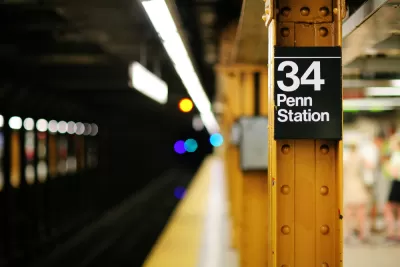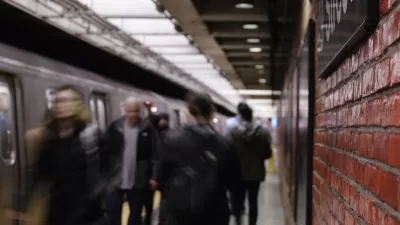A coalition of community groups claims that current plans are designed to benefit developers and don’t guarantee improvements for transit riders.

Penn Station’s long-awaited redevelopment hit another snag as several citizen groups filed a lawsuit against Empire State Development and the New York State Public Authorities Control Board, claiming that the agencies did not conduct a proper environmental review and “improperly” entered a revenue-sharing agreement with the city. Colleen Wilson reports on the case for NorthJersey.com.
“At issue is the more than 18 million square feet of commercial, residential and hotel space proposed on properties in the immediate vicinity of Penn Station.” Revenue from these projects is meant to fund other improvements to the station area, such as additional tracks, new entrances and elevators, and a new pedestrian corridor, but the plaintiffs in the suit say “there's "no basis" for ESD's claim that it would generate the revenue needed to fund New York's share of station projects.”
As Wilson explains, the historic station has become a notorious choke point in New York’s public transportation system. “The now-54-year-old structure was designed to handle 200,000 people a day, but for at least two decades it has operated over capacity, with as many as 650,000 people using the station daily in 2019.”
See the source article for more details on the lawsuit and how it could affect the redevelopment plans.
FULL STORY: Giving us mediocrity:' Penn Station remodel controversy lands in court

Maui's Vacation Rental Debate Turns Ugly
Verbal attacks, misinformation campaigns and fistfights plague a high-stakes debate to convert thousands of vacation rentals into long-term housing.

Planetizen Federal Action Tracker
A weekly monitor of how Trump’s orders and actions are impacting planners and planning in America.

San Francisco Suspends Traffic Calming Amidst Record Deaths
Citing “a challenging fiscal landscape,” the city will cease the program on the heels of 42 traffic deaths, including 24 pedestrians.

Defunct Pittsburgh Power Plant to Become Residential Tower
A decommissioned steam heat plant will be redeveloped into almost 100 affordable housing units.

Trump Prompts Restructuring of Transportation Research Board in “Unprecedented Overreach”
The TRB has eliminated more than half of its committees including those focused on climate, equity, and cities.

Amtrak Rolls Out New Orleans to Alabama “Mardi Gras” Train
The new service will operate morning and evening departures between Mobile and New Orleans.
Urban Design for Planners 1: Software Tools
This six-course series explores essential urban design concepts using open source software and equips planners with the tools they need to participate fully in the urban design process.
Planning for Universal Design
Learn the tools for implementing Universal Design in planning regulations.
Heyer Gruel & Associates PA
JM Goldson LLC
Custer County Colorado
City of Camden Redevelopment Agency
City of Astoria
Transportation Research & Education Center (TREC) at Portland State University
Jefferson Parish Government
Camden Redevelopment Agency
City of Claremont





























